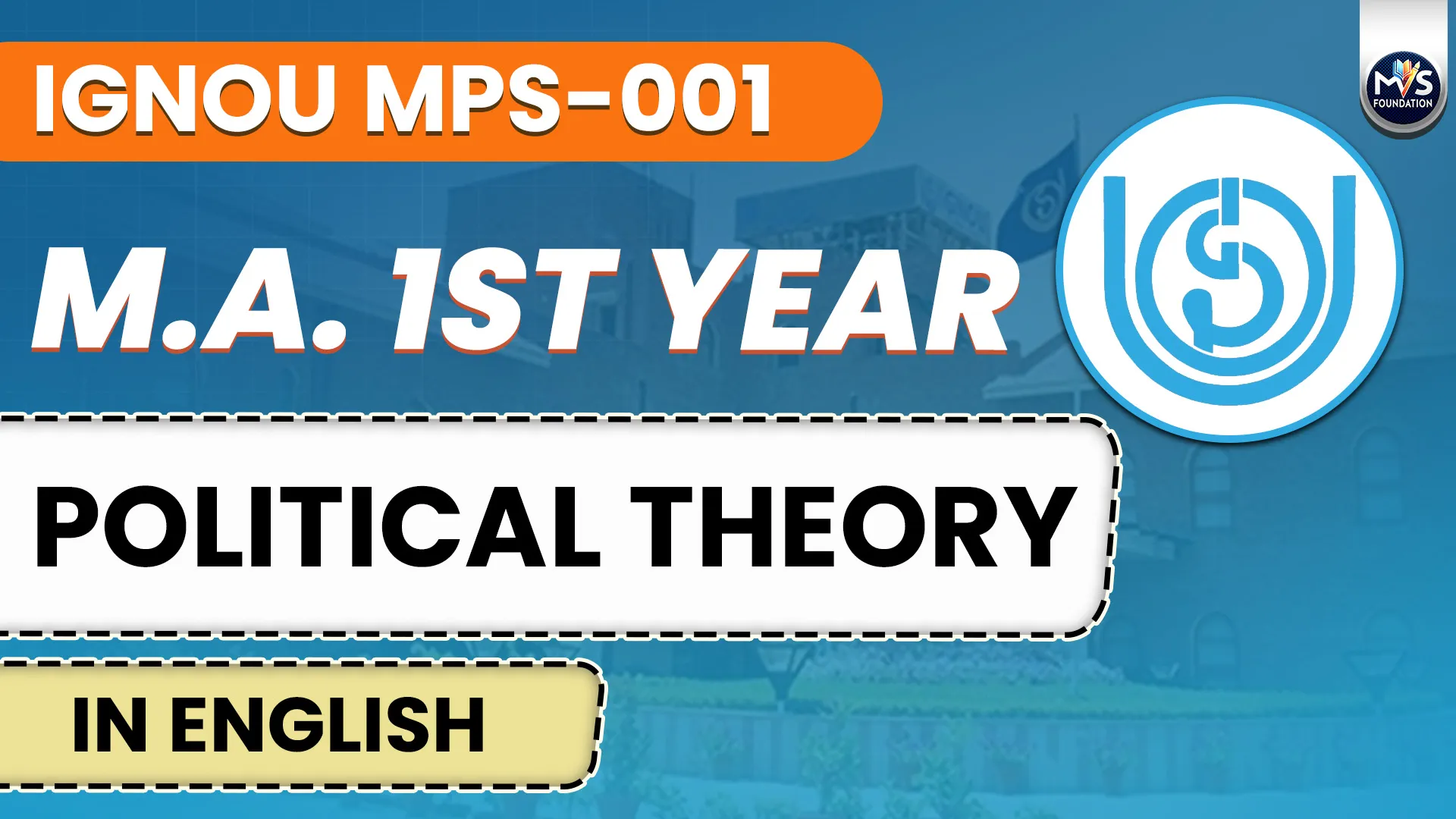
Get in Touch
We will get back to you within 24 hours.
Welcome to MVS Blog

Q1 - What is political theory? Explain its characteristics and importance/relevance.
Answer -
Introduction
Political theory is the systematic study of the state, government, political institutions, and their functioning. Politics is not just a means to attain power but also a tool to run society smoothly. As Aristotle stated in his book Politics, "Man is a social animal," and livinge in a community is his necessity. However, within this community, various issues related to power, justice, and freedom arise. Political theory examines these issues and helps in shaping the direction of an ideal society.
what is political theory ?
Political theories describe, explain and analyze the political events and processes of society and suggest measures to overcome their shortcomings. Its history is more than 2400 years old, in which various philosophers, sociologists and politicians contributed. Political theories have constantly changed due to time and socio-economic changes. This type of study is divided into different streams, such as classical, liberal, Marxist, behavioral and contemporary. These streams have different viewpoints, which make the study of politics broad and diverse.
Meaning of political theory:
'Political theory' is made up of two words: 'politics' and 'theory'. The word 'politics' is derived from the Greek word 'polis', which means "city-state". 'Theory' comes from the Greek word 'theory', and it is connected with two words: 1. Theoria: It means the process of understanding what is happening around us. We also call it 'theorizing', that is, the process of thinking and understanding about a subject. 2. Theorema: It is the conclusion that comes out of this thinking process. We also call it 'theorem', that is, the result that we get after understanding.
Views of different thinkers on political theory:
Features of political theory:
1. personal reflection and hypothesis - Individual reflection and imagination play an important role in political theory. It reflects the thinking, experience and attitude of the individual in the development of ideology. Political thinkers like Plato, Aristotle, Machiavelli etc. presented their individual perceptions in the socio-political context of their time. These thinkers not only find solutions to the problems of their time, but they also provide guidelines for the future. Thus, individual reflection provides depth and variety to political theory.
2. Interpretation of the individual, society and history- Political theory examines individuals, society, and history in depth. It studies how society is organized, its key elements, and the sources of conflict. It also considers how these conflicts can be resolved and how society should function.
3. Subject-specific theories- Political theory is often based on specific themes such as
justice, freedom, equality, etc. The thinkers who present these may be philosophers, historians, economists or sociologists. For example, Aristotle's theory is a mixture of philosophy and politics, while Marx's theory is based on economics and sociology.
4. Means of social change - Political theories are not limited to merely explaining facts but also suggest means for social change. They recommend methods such as reform, revolution or protection. As Laski has said, they also aim to determine "what ought to be." Thus, political theory not only analyses present conditions but also explores future possibilities.
5. inclusion of ideology - Ideology has an important place in political theories. Ideologies such as liberalism, Marxism and socialism are reflected in these theories. These ideologies not only enrich political discourse but also help in finding solutions to problems from different perspectives. Thus, the inclusion of ideology makes political theory multidimensional.
Importance/Relevance of Political Theory:
1. Understanding the nature of state and government
Political theories help us understand the nature, purposes, and functioning of the state and government. These theories explain why the state exists, what its functions are, and how it should operate. For example, the theories of Locke and Rousseau explain the origin of the state and its purposes.
2. Connecting social and political reality
Political theories establish a relationship between the reality of society and its ideals. These theories explain what the ideals of a society should be and how they can be achieved. For example, Gandhian theories link the ideals of truth and non-violence to social order.
3. Making people aware of their rights and duties
Political theories make a person aware of his rights, duties, freedom, equality and justice. These theories explain what should be the role of a person as a citizen and how he can be made responsible towards the society. For example, John Rawls' 'Theory of Justice' underlines the importance of equality and justice.
4. Solution of social and economic problems
Political theories analyze contemporary problems such as poverty, corruption, racism, and environmental crisis and suggest alternative ways to solve them. For example, Marxist theory proposes a communist system to overcome economic inequality.
5. Guidance for social change and reform
Political theories are not limited to merely explaining the current situation but also provide guidance for social change and reform. These theories inspire to improve society through reformist or revolutionary methods. For example, during the French Revolution, the principles of liberty, equality and fraternity gave a new direction to society.
Conclusion
Political theory explains politics, state, government, justice and freedom. It helps in understanding society, individuals and history and shows the way for social reform and policy making. Its relevance lies in the stability of democracy, human rights and justice. It not only explains the political reality but also helps in bringing positive change in the society and making politics more accountable.
1 Response